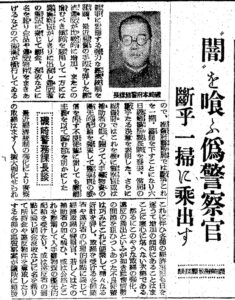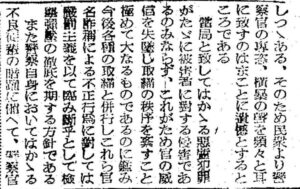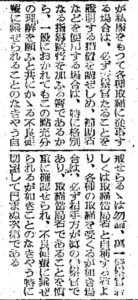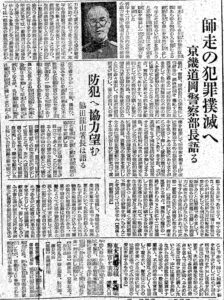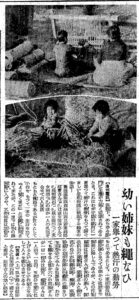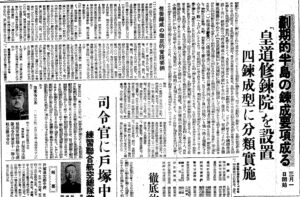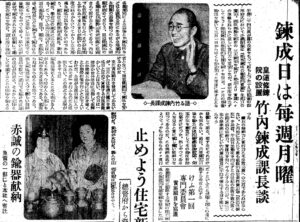In February 1944, Governor-General Koiso gave a speech in which he used some pretty wild religious arguments, quoting passages of Nihon Shoki, the Shinto bible, to justify the Japanese-Korean unification campaign to erase Korean language, culture, and ethnic identity in Korea. Being a fanatical religious fundamentalist and a fervent follower of Master Imaizumi, Koiso actually believed that the mythology of Nihon Shoki was literal truth.
In his speech, Koiso claimed that all Koreans were descendants of the god Susanoo-no-mikoto, the younger brother of Amaterasu, the Sun Goddess who was the ancestor of the Emperor and the Japanese nation. According to the Nihon Shoki, the Shinto bible, Susanoo-no-mikoto was sent to Korea by his father to become its ruler, and Koiso suggested that Susanoo-no-mikoto was the same person as Dangun, the mythological founder of Korea. Koiso also suggested that, when a son of Susanoo-no-mikoto (the younger brother) subordinated himself to a grandson of the Sun Goddess (the older sister) by performing a "divine ritual handover of the country", the precedent was established whereby the descendants of the younger brother (i.e. the Korean people) would be subjugated by the descendants of the older sister (i.e. the Japanese people). Koiso claimed that the annexation of Korea in 1910 was the same "divine ritual handover of the country" that was performed in mythological times.
This explains a lot of things, like why Koiso persisted in using words like "Know yourselves!" and "Know your true nature!" to address the Korean people. Now we know that it was actually a command to the Korean people to remember the fact that they were descendants of Susanoo-no-mikoto. It also reveals that Japanese-Korean Unification never meant that the assimilated Koreans would be equal to native Japanese people. Instead, the Koreans would remain subordinate to the Japanese in accordance with the precedent established by the "divine ritual handover" which happened in mythological times. This is also consistent with Master Imaizumi's analogies comparing Japanese-Korean unification with an unequal parent-child relationship or rider-horse relationship.
This religious fanaticism which infected the colonial regime also explains other things which are not so easily explained through the cold calculated logic of war. For example, it boggles the mind why the colonial regime would divert precious labor and resources to build hundreds of Shinto shrines all over Korea in 1944 in the middle of a desperate war. But it all makes sense when you realize that this was all part of an effort to complete the divinely ordained "ritual handover", in which the complete subordination of the descendants of Susanoo-no-Mikoto to the Emperor, the descendant of the Sun Goddess, would end the calamity that was the U.S. and Britain.
To put it in another way, the official line of the colonial regime was that the Koreans had always been Japanese people all along - they just didn't know it yet. The regime hoped that forcibly re-educating the Koreans would help them remember their "true nature" and awaken as true Japanese people to fulfill divinely ordained destiny. However, that spectacularly backfired, since it only deepened their anger and resentment until things exploded with the end of Imperial Japanese rule in 1945.
Koiso's vanity is evident in how he includes a photo of a rough draft of his speech in the newspaper, presumably to burnish his credentials as a deep thinker and writier, when in actuality his words sound a lot like they were copied from Master Imaizumi. The three parts of his speech were spread out over three days: February 16 (part 1), February 18 (part 2), and February 19 (part 3), but the rough draft photographed in this article is actually an excerpt from part 3 of his speech in which he rails against the evils of Marxism.
This article is full of references to lots of religious terminology from the Shinto religion, so I've added plenty of links to Wikipedia pages and other resources for further reading. Following the translation, I've also posted an excerpt from a mainstream academic article about Soshimori, a place in Silla which is mentioned by Koiso.
(Translation)
Gyeongseong Ilbo February 16, 1944
Thorough adherence to the true meaning of the National Body brings inevitable victory! (Transcript of Governor-General Koiso's Speech) [1]
Know the historical facts and know yourselves!
It is plainly clear that the Japanese and the Koreans share the same ancestry
On February 3rd, to mark the occasion of the anniversary of the founding of the Imperial Japanese nation, the Korean Federation of National Power dispatched a cheerleading team of 142 members from the Special Volunteer Press Corps to Seoul Citizens Hall to take part in the Movement of National Peoples Rising Up En Masse to Destroy the U.S. and Britain, which was unfolded all over Korea. Governor-General Koiso, who attended as the President of the Federation, gave an impassioned speech of encouragement regarding "the current state of the war and the mission that Korea has been entrusted with". His words which so deeply moved the corps members, as previously reported, are reproduced below.
The head office of this newspaper took a shorthand copy of the speech and asked the Governor-General to review it, upon which he spent almost all of Sunday, February 13 painstakingly making careful additions and corrections, before he left for his inspection tour of the north and south of the country. Therefore, we have decided to publish this speech as follows, in order to make the Governor-General's intentions known as widely as possible in view of the national movement that is currently being unleashed like a raging storm among the various towns (eup) and townships (myeon).
[This photograph shows Governor-General Koiso and a part of his revisions to a transcript of his speech]
As we welcome the third new spring of the Greater East Asia War, we the people totaling 100 million, regardless of whether we are on the front lines or on the home front, must gather all our strength and renew our spirit to achieve a great victory in the decisive battle that we must anticipate this year. In order to respond to the will of the gods in the autumn, and in order to arouse our determination to fight, we must urge all 25 million of our Korean compatriots to rise up en masse. It is my sincere pleasure as the President of the Federation to have this opportunity to address a few words in response to the magnificent appearance of the newly organized Special Volunteer Press Corps, which has been formed for this purpose. However, due to the nature of my duties, I have not had time to make any prepared statements, and so I must confess that I am faced with a situation in which I must make do with a few of my own impromptu words.
First of all, I would like to say that you must first know your own true nature before you can come and rally together en masse as part of the 100 million. It is clearly stated in historical fact that Susanoo-no-Mikoto, the younger brother of our ancestor Amaterasu, was appointed by his father Izanagi-no-Mikoto to rule over the four provinces (Yomotsukuni), and that he established his base in Korea. In other words, the Japanese classic text "Nihon Shoki" (The Chronicles of Japan) clearly states, "At this time, Susanoo-no-Mikoto brought his son Isotakeru and descended to Silla, arriving in a place called Soshimori".
Silla refers to Korea because Silla was the dominant ruling power in Korea at the time when the "Nihon Shoki" was written. The place name Soshimori contains the Korean words "so" and "mori": "so (소)" is the Korean word for bull and "mori (머리)" is the Korean word for head. The word "shi" is an auxiliary particle. Thus, Soshimori means bull-head in Korean. That is why Susanoo-no-Mikoto is called Gozu Tennō, or the bull(go)-headed(zu) divine king, in mainland Japan.
Later, when Susanoo-no-Mikoto's son Ōkuninushi was based in Izumo and ruling his region, Ninigi-no-Mikoto, who was the grandson of Amaterasu, who in turn was the older sister of Susanoo-no-Mikoto, was summoned down to Japan by Susanoo-no-Mikoto to rule the country. In response, Ōkuninushi, the son of Susanoo-no-Mikoto, subordinated himself to Ninigi-no-Mikoto, since he realized that the land should really be ruled by the grandson of Amaterasu. That was how the unification of the two countries was established through the so-called "divine ritual handover of the country".
Some people say that "Gija Joseon" was the historical founding ancestor of Korea. However, according to historians, that was merely a so-called 'historical fact' created by the Chinese of that time, who wanted to show off the greatness of China to the world by making the contrived argument that the founding ancestor of Korea was Gija, who came from Northern China. I believe that it is closer to the truth that "Dangun Joseon" was the true founding ancestor of Korea.
We do not know who Dangun really was. Some historians say that Dangun was Susanoo-no-Mikoto, while others say that Dangun was Susanoo-no-Mikoto's son, Isotakeru. In any case, I think it is almost certain that the ancestors of our 25 million compatriots on the Korean Peninsula today can truly be traced back to Susanoo-no-Mikoto.
Subsequently, the annexation of Korea took place in 1910 during the Meiji Era. I am convinced that there can be no mistake in asserting that what took place in Korea in the Meiji Era was exactly the same "divine ritual handover of the country" that was performed between Ninigi-no-Mikoto and Ōkuninushi at the end of the divine era.
The various deities who served Ōkuninushi at the end of the divine era were called Kunitsugami (gods of the earth), and the various deities who served Ninigi-no-Mikoto were called Amatsugami (gods of the heavens). These days, there are various publications mentioning the gods of the heavens and the earth, but these are actually references to Kunitsugami and Amatsugami. When we see that everyone is descended from the two pillar gods Izanagi and Izanami, then we see that the gods of the heavens and the gods of the earth both share a common ancestry.
This is the reason why, ever since I took office, I have always proclaimed that the Japanese and the Koreans have the same roots and the same ancestry. Otherwise, it defies comprehension as to why, for thousands of years on the Korean peninsula, there has existed an independent ethnic group that has remained completely distinct from all the other peoples. Ever since I took office in Korea, I have been asking you to know your own nature first, in order for you to know that the Japanese and the Koreans are one people.
Fortunately, as I have just said, if you can clearly recognize your own true nature, then I am convinced that you will inevitably be able to come to your senses and rally together here en masse as a part of one people of 100 million.
For several years now, there have been many calls for Japanese-Korean unification. However, as I see it, it is rather lamentable that we have to cry out for Japanese-Korean unification in the first place. I believe that the fact that the people are not conscious of Japanese-Korean unification unless they are reminded of it, indicates that the general public has neglected to investigate the true nature of themselves.
Over 30 years have passed since the annexation of Korea, and we have truly made remarkable progress since then. However, as much as I might regret saying this, I believe that, during the years since the annexation, if we had only cultivated a little more deeply in the areas that I mentioned just now, the past 30 years would have taken an even more glorious trajectory. I think this point is very important, and therefore, I would like to add a few words …
Source: https://www.archive.org/details/kjnp-1944-02-16
[In contrast, here is a mainstream academic article about Soshimori:]
An early Korean cultic center in the kingdom of Silla was located in the vicinity of a trapezoid-shaped hill that was called, in the Japanese rendering of the classical Korean, soshimori. In ancient Korea and Japan, cattle, especially bulls, were sacrificed for rain, good harvests, and the prevention of disease, and soshimori was one of the major Korean cultic sites at which such sacrifices were offered. According to Kubota Osamu, the "soshi" part of the word soshimori means bull and the "mori" means head, and thus the site was called "Bull's Head Mountain." Bull sacrifice is, of course, not unique to the ancient Korean and Japanese cultures, but the role and significance of the bull is especially relevant with regard to our Heavenly Divinity story.
In one early version of that story Mutō Tenjin is identified with Gozu Tennō, the bull (go)-headed(zu) divinity, but in another version of it Gozu Tennō is said to be Mutō Tenjin's eldest son. In either case Mutō Tenjin and Gozu Tennō are intimately linked in that the name "Gozu" (Korean, soshimori) is the same as the name of the hill in Silla where Mutō Tenjin resided. In early Japan various divinities were linked together and traditions conflated, not by way of the well known honji-suijaku ("original-trace") mechanism of later days whereby relations of identity were made between specific native divinities and specific Buddhas or bodhisattvas for various and sometimes convoluted reasons but by way of the relatively simple technique of name linkage. That is, a certain divinity known by one name is found to have another name, and thus the formerly two divinities that were identified by different names are coalesced into a single divinity known by several names.
Source: McMullin, N. (1988). On Placating the Gods and Pacifying the Populace: The Case of the Gion “Goryō” Cult. History of Religions, 27(3), 270–293. http://www.jstor.org/stable/1062279
(Transcription)
京城日報 1944年2月16日
国体本義に徹せる必勝不敗 小磯総督 講話速記 【一】
史実と自己を知れ
正に明か内鮮は同祖
紀元の佳節を期して全鮮一斉に展開された米英撃滅国民総蹶起運動に総力聯盟から派遣の報道特別挺身隊員百四十二名の壮行会が去る二月三日京城府民館で挙行された席上、聯盟総裁として臨席した小磯総督は『戦局の現段階と朝鮮の負荷する使命』につき熱烈たる激励の弁を与え、隊員として感奮せしめたことは既報の通りである。
本社は当日特に右の講話を速記し、総督に検閲を乞った處、全南北巡視に出発される二月十三日の日曜日の殆ど全部を費やして入念な加筆、訂正の労を執られた。仍て本社は現に各邑面間に怒涛の如く捲き起こされている国民運動につき、総督の意図を限りなく周知せしむるため左にこれを掲載することにした。
【写真は小磯総督と総督の加筆訂正した講話速記の一部】
大東亜戦争第三の新春を迎えて我々一億国民はその職域が第一線にあろうと銃後にあろうことを問わず、総力を結集し気魄を新にして、見事今年予期すべき決戦に大勝利を把握致し以て聖旨に応え奉らねばならぬ秋に方り、茲に決戦意欲昂揚のため半島二千五百万同胞の総蹶起を促さんがために、今回新に編成せられました報道特別挺身隊諸君の壮容に接しまして、一言所懐を述べる機会を得ますことは本総裁の心から欣快とする所であります。唯だ職務の関係上何等準備を整え得る余暇を得なかったために、結局思いつきを述べてその責を塞がねばならぬ事態に直面しておることをお断り致します。
第一にお話申し上げたいと思いますことは、先ず自己の本質を知って然る後一億結集に向えということであります。我が皇祖天照大神の弟神であらせられまする素戔嗚尊は、その父神様の伊弉諾尊の御命令によりまして四方国(ヨモツクニ)の統治に任ぜられることになり、この根拠を朝鮮に置かれましたことは史実の明記する所であります。即ち我が古典日本書紀の中に、『是時、素戔嗚尊、帥其子五十猛神降到新羅国、居於曾尸茂梨之處』と明記しております。
新羅国というのはこの日本書紀の著述せられました当時、朝鮮を統治しておる所の雄国が新羅でありました故に、朝鮮ということを現わすのに新羅という名を以てしたという訳であり、『曾尸茂梨』ということは朝鮮語の『ソモリ』が牛頭である、『ソ』は牛であり、『モリ』は頭で『尸』というのは助辞でありましょうか。『曾尸茂梨』は結局牛頭ということでありましょう。さればこそ日本内地に於いては素戔嗚尊を牛頭(ゴヅ)天王と呼ばれるのであります。
その後素戔嗚尊の御子大国主命が出雲に根拠してあの地方を統治しておられました当時、素戔嗚尊の姉神様でいらせられ天照大神の御孫に当られる皇孫瓊瓊杵尊を日本にお降しになって統治を命ぜられました。茲に素戔嗚尊の御子大国主命は天孫瓊瓊杵尊の降臨に召し、この国土は正に天孫の統治せられる處であろうというので、所謂国譲りの神事ということによって合体が成立したのであります。
朝鮮の歴史の始祖を箕子朝鮮と称する向もありますが、之は史家の明言しておる如く、蓋し当時の支那人が支那の大を天下に誇らんがために、朝鮮の始祖を北支那から流れて来た箕子によって拓かれた所であると牽強付会な議論を立てることによって唱えられた史実であり、寧ろ檀君朝鮮と呼ばれることのほうが真実性が多いと承っております。
檀君とは果して如何なる方であるかは判りませんが、一史家の唱える所によれば、檀君とは素戔嗚尊なり、又一説曰く、檀君とは素戔嗚尊の御子、五十猛神なりという説もあります。何れに致しましても朝鮮半島におりまする現在の二千五百万同胞の祖先は正に素戔嗚尊に帰一しておるということは殆ど断言して誤りないのじゃないかと思います。
そうして降って明治四十三年韓国併合ということが明治の聖代に行われましたが、これは即ち申す迄もなく神代の末期に於いて瓊瓊杵尊と大国主命の間に執り行われたる国譲りの神事が、正に明治の聖代に於いて行われたものであると断言して一つも間違いがないと確信致します。
神代の末期に於いて大国主命に仕え奉ったる諸々神、これを国津神と称し、瓊瓊杵尊に仕え奉ったる諸々神はこれを天津神と称しまして、今日色々の書物に天神地祇、即ち天津神、国津神というのはそういう所から出ておるものと思います。そうしてその元が総て伊弉諾、伊弉冉の二柱の神に出発しておる所から見れば、天神も地祇もその祖を同じうしておる訳であります。
これ即ち私が就任以来今日に至る迄、内鮮は同根同祖なりと叫び来っておった所以であり、又さもなくんばこの半島に、古来数千年全く他と異なったる独立民族の存在しておるということも解し兼ねる所であり、これが私の朝鮮に職を奉ぜる時以来内鮮が同胞であることを知る為に、先ず自らの本質を知れというて参ったのであります。
そうして幸いに今私が申し述べた如く、その本質を明確に自認体得し得ると致しましたならば茲に一億結集の必然なくてはならないことをも自覚せしめられるものであると確信しておるのであります。
数年前から内鮮一体の叫びは盛んであります。しかし観じ来れば、内鮮一体と叫ばねばならないということそのことが、寧ろ嘆かわしい次第じゃありますまいか。そういうようなことを言わなければ内鮮一体を意識しないというようなこと程左様に一般の人々が自己の本質ということを究明するのを怠っておったことになると思うのであります。
日韓併合以後茲に三十数年、洵に目覚ましい発展を遂げては来ておりますが、甚だ言いすぎる憾みもありますけれども、若しこの併合の当初より今迄私が申し述べましたような所にもう少し深く培って来ておりましたならば、この三十年というものは更に輝かしい道程を辿っておったのではないかと考えさせられるのであります。この点甚だ重要であろうと思いますが、故に蛇足ながら少し付加えさせて頂きましょう。










